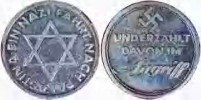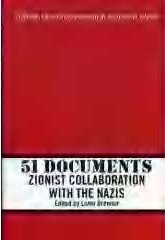Western historians call the Bolshevik revolution the Russian Revolution, but the Bolsheviks themselves regarded it as triggering a world-wide revolt. So also did the capitalists of Britain, France and America, who saw the Communist success galvanising the left wing of their own working classes. Like all social orders that cannot admit the fact that the masses have justification to revolt, they sought to explain the upheavals, to themselves as well as the people, in terms of a conspiracy – of the Jews. On 8 February 1920, Winston Churchill, then the Secretary for War, told readers of the Illustrated Sunday Herald about “Trotsky ... [and] ... his schemes of a world-wide communistic state under Jewish domination”. However, Churchill had his chosen Jewish opponents of Bolshevism – the Zionists. He wrote hotly of “the fury with which Trotsky has attacked the Zionists generally, and Dr Weizmann in particular”. “Trotsky,” Churchill declared, was “directly thwarted and hindered by this new ideal ... The struggle which is now beginning between the Zionist and Bolshevik Jews is little less than a struggle for the soul of the Jewish people.” [i]
The British strategy of using both anti-Semites and Zionists against “Trotsky” rested ultimately on Zionism’s willingness to co-operate with Britain in spite of the British involvement with the White Russian pogromists. The WZO did not want pogroms in Eastern Europe, but it did nothing to mobilise world Jewry on behalf of the Jews beleaguered there. Weizmann’s statements at the time, as well as his memoirs, tell us how they saw the situation. He appeared at the Versailles Conference on 23 February 1919. Once again he enunciated the traditional line on Jewry shared by both anti-Semites and Zionists. It was not the Jews who really had problems, it was the Jews who were the problem:
Jewry and Judaism were in a frightfully weakened condition, presenting, to themselves and to the nations, a problem very difficult of solution. There was, I said, no hope at all of such a solution – since the Jewish problem revolved fundamentally round the homelessness of the Jewish people – without the creation of a National Home. [ii]
The Jews, of course, presented no real problem – neither to the nations nor to “themselves” – but Weizmann had a solution to the non-existent “problem”. Once again Zionism offered itself to the assembled capitalist powers as an anti-revolutionary movement. Zionism would “transform Jewish energy into a constructive force instead of its being dissipated in destructive tendencies”. [iii] Even in his later years Weizmann could still only see the Jewish tragedy during the Russian Revolution through the Zionist end of the telescope:
Between the Balfour Declaration and the accession of the Bolsheviks to power, Russian Jewry had subscribed the then enormous sum of 30 million rubles for an agricultural bank in Palestine; but this, with much else, had now to be written off ... Polish Jewry ... was still suffering so much in the separate Russo-Polish War, that it was incapable of making any appreciable contribution to the tasks which lay ahead of us. [iv]
Weizmann saw Zionism as weak in all respects with only a toe-hold in Palestine. Eastern Europe was “a tragedy which the Zionist movement was at the moment powerless to relieve”. [v] Others were not so torpid. The British trade unions organised an embargo of arms shipments to the Whites. French Communists staged a mutiny in the French Black Sea fleet. And, of course, it was the Red Army that tried to protect the Jews against their White murderers. But the WZO never used its influence, either in the Anglo-Jewish community or in the seats of power, to back up the militant unionists. Weizmann completely shared the anti-Communist mentality of his British patrons. He never changed his opinion on the period. Even in Trial and Error, he still sounded like a high Tory writing of “a time when the horrors of the Bolshevik revolution were fresh in everyone’s mind” (my emphasis). [vi]
----------
i. Winston Churchill, Zionism versus Bolshevism, Illustrated Sunday Herald (8 February 1920), p.5.
ii. Weizmann, Trial and Error, p.243.
iii. Leonard Stein, The Balfour Declaration, p.348.
iv. Weizmann, Trial and Error, pp.240-1.
v. Ibid., p.242.
vi. Ibid.. p.218.



No comments:
Post a Comment